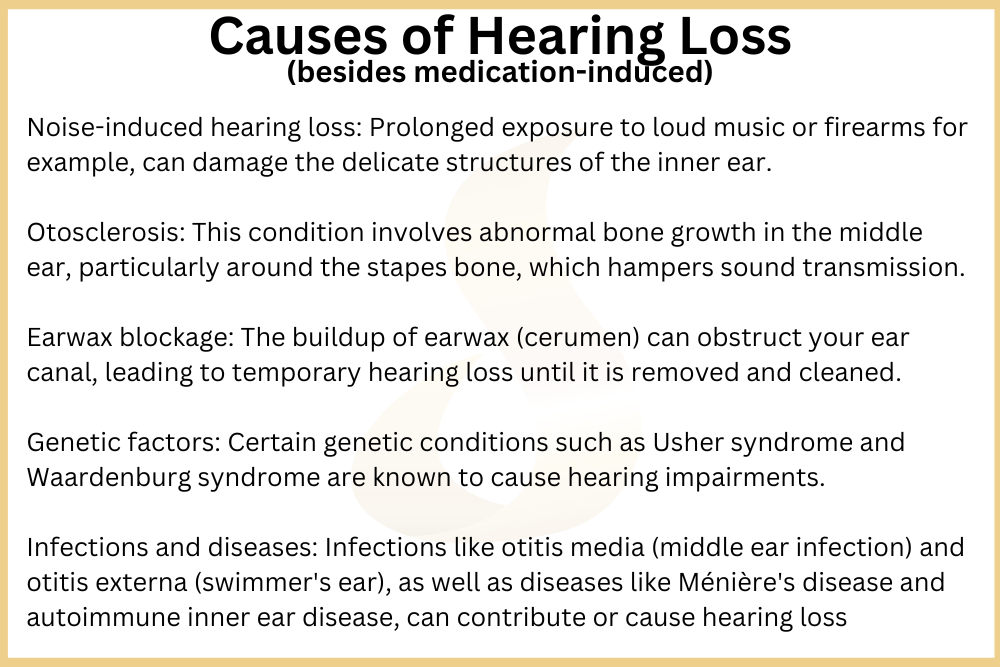What's On This Page?
ToggleThis blog is dedicated to informing you about which medications that lead to hearing loss.
Hearing loss is something that is very hard to deal with, whether it’s yourself, or a relative, the whole family suffers. The person in the room who can’t hear well feels isolated and lonely at times.
Deficits in hearing occur for a variety of reasons, usually age-related and it is a slow, gradual type of hearing loss. It usually affects both ears. The medical term for that is “presbycusis.” It’s what most people think of. There are other common causes for this problem which I’ve listed below in my graphic.
As a pharmacist, I can assure you there is not much help in the way of medications. There isn’t anything that works, on the contrary! Some of the drugs dispensed from the pharmacy can actually cause hearing loss and/or tinnitus (that high-pitched sound that millions of people hear).
According to the National Institute on Deafness and Other Communication Disorders about 38 million adults in the United States have some degree of hearing loss. This accounts for about 15% of the adult population. Most of that is the result of presbycusis, but what if I told you that 6 popular categories of medication can also cause issues with your ability to hear clearly.

You Probably Know Someone with It
Because millions of people are affected, you probably know someone suffering from hearing loss. My own dad has hearing loss and it has gotten harder to communicate with him. And as for famous people, I know a few other historical ones, and I bet you do too!
Top of the list, is renowned composer and pianist, Beethoven! He started to lose his hearing in his late twenties and eventually became completely deaf. And then there was Thomas Edison who is responsible for our electric lightbulbs! And Vincent van Gogh is thought to have hearing challenges due to inhaling the lead fumes from his paints! These are just a few examples of people you know who experienced serious hearing challenges and were still creative and resilient!

I don’t want to scare anyone. Medication-induced hearing loss is generally considered a rare side effect but it does happen. Some drugs have a known risk of causing hearing impairment. Here they are:
1. Loop diuretics: Loop diuretics, including furosemide (Lasix) and ethacrynic acid (Edecrin), are commonly prescribed for conditions like edema and hypertension. In some cases, high doses of these medications have been associated with hearing loss and/or tinnitus.
2. Nonsteroidal anti-inflammatory drugs (NSAIDs): Although less common, some NSAIDs, including ibuprofen (Advil, Motrin), naproxen (Aleve), and aspirin, have been reported to have potential hearing-related side effects like hearing loss and/or tinnitus. This is particularly more evident when taken in high doses or for an extended period.

3. Aminoglycoside antibiotics: Certain antibiotics from the aminoglycoside class, such as gentamicin (Garamycin), tobramycin (Nebcin), and streptomycin, have been linked to hearing impairment and tinnitus. Prolonged use or high doses increase your risk.
4. Chemotherapy drugs: Certain chemotherapy agents used in cancer treatment have been associated with potential hearing loss and tinnitus. Examples include cisplatin, carboplatin (Paraplatin), and vincristine (Oncovin).
5. Quinine: Quinine is a medication primarily used to treat malaria and muscle cramps. It has been associated with hearing loss, especially when used in high doses or for prolonged periods. Qualaquin and Quinine Sulfate, as well as hydroxychloroquinine (a relative) have been associated with hearing problems. You may enjoy my article, How Plants Make Medicine because it talks about how quinine and other medications came about.
6. Salicylates: High doses of salicylates, such as aspirin, have been linked to temporary hearing loss and/or tinnitus.
Salicylates are a group of chemicals found naturally in various plants and can also be synthesized for use in medications. You eat them every day. Natural sources of salicylates include fruits, such as strawberries and oranges, and vegetables like spinach and tomatoes.
Salicylates have anti-inflammatory, analgesic, and antipyretic properties! This makes them useful for treating pain, fever, and inflammation. However, high doses or prolonged use of salicylates can potentially cause side effects, including gastrointestinal irritation, allergic reactions, and in rare cases, hearing loss or tinnitus.
Salicylates have various applications beyond medicine, such as food preservation and flavoring, as well as skincare products. Wintergreen oil is a natural source of methyl salicylate, and you might have that in your breath-freshening mouthwash or gum! It makes the minty flavor. It’s also often used in topical pain relief products.

What Should You Do if You Develop Hearing Loss?
If you experience medication-induced hearing loss or suspect you me having this side effect, see an expert, specifically an ENT(Ear Nose and Throat) physician. Technically, they may be called otolaryngologists. They can fully evaluate you and see if there is an association with your medication(s). They may have to order additional tests such as audiograms or other hearing assessments to determine the extent and nature of the hearing loss.
Please don’t just quit a drug, that isn’t wise because some medications require a taper. So if you want to talk to a healthcare professional or pharmacist for personalized advice about all this, make your appointment and share all the details of when you started the medication, and when the hearing problems began.
Be sure to provide as much history as possible during your appointment. Remember, there are suitable alternatives nowadays to all the medication categories so if a particular drug is troublesome, you can easily get an alternative.
Consider Zinc! Many medications can cause a zinc deficiency via the drug mugging effect. Long-term use of acid blocking medications or PPI drugs can cause a zinc deficiency, so can steroid use and oral contraceptive use! Read this article, Dangerous Drug Mugging Effect by Acid Blockers.
Anyway, there is evidence to suggest that zinc deficiency (whatever the cause) may be associated with an increased risk of hearing loss and tinnitus. Several studies have explored the relationship between zinc levels and hearing health. Here are a few key findings:
Age-related hearing loss: Zinc has been studied for its potential protective effects against age-related hearing loss. Some research suggests that zinc supplementation may help prevent or slow the progression of age-related hearing loss in certain individuals.
Noise-induced hearing loss: Exposure to loud noise can lead to oxidative stress and damage in the inner ear. Zinc has antioxidant properties that may help protect against such damage. Studies have indicated that zinc supplementation prior to noise exposure may reduce the risk of noise-induced hearing loss.
Tinnitus: Zinc deficiency has been associated with tinnitus in some studies. Zinc supplementation has shown potential benefits in reducing tinnitus severity, particularly in individuals with low zinc levels.
While these findings indicate a potential relationship between zinc deficiency and hearing loss/tinnitus, it is important to note that further research is needed to fully understand the underlying mechanisms and also I am not making any direct claims that zinc will reverse hearing loss because it will not.
If you suspect a zinc deficiency or have concerns about your hearing health or tinnitus, it is recommended to consult with a healthcare professional. He or she can evaluate your specific issues, conduct appropriate tests, and provide personalized recommendations regarding zinc supplementation or other treatment options. If you’re interested in a high-quality chelated (easy on the tummy) zinc supplement, CLICK HERE.
Potential Treatments for Hearing Impairment
Cochlear Implants: Cochlear implants are electronic devices that provide a sense of sound to individuals with severe to profound hearing loss. These implants bypass the damaged parts of the inner ear and stimulate the auditory nerve directly. Ongoing research aims to improve the technology, expand candidacy criteria, and enhance speech understanding and music appreciation for cochlear implant users.
Gene Therapy: Gene therapy holds promise for certain types of genetic hearing loss but it really depends on several variables. Researchers are exploring the use of viral vectors to deliver functional genes to the inner ear cells, aiming to restore or improve hearing in individuals with specific genetic mutations associated with hearing loss.
Stem Cell Research: Stem cell therapy has the potential to regenerate damaged sensory cells in the inner ear. Scientists are studying the use of stem cells to replace or repair damaged hair cells or auditory neurons, which could, theoretically restore hearing function. While still in the experimental stage, this research offers some hope.
Auditory Brainstem Implants (ABIs): ABIs are designed for individuals who cannot benefit from cochlear implants due to abnormalities in the auditory nerve. These devices bypass the cochlea and directly stimulate the brainstem to help restore auditory perception, or at least try to restore some of it.
Pharmacological Treatments: Researchers are investigating various medications and compounds that could potentially protect or restore hearing function. These include antioxidants, anti-inflammatory drugs, and drugs targeting specific molecular pathways involved in hearing loss. The goal is to develop pharmaceutical interventions to prevent or treat certain types of hearing loss. We know zinc deficiency is tied to hearing impairments.
It’s important to note that advancements in the field of hearing loss continue to evolve rapidly and also I am a pharmacist so this is NOT my specialty. This is why I urge you to see a doctor that is an ENT and that way you will have access to all the new research studies, clinical trials, and innovative technologies may have emerged since this blog. Now I will provide some helpful Internet sites.
Resources and Websites
National Institute on Deafness and Other Communication Disorders (NIDCD): The NIDCD offers comprehensive information on research updates, treatment options, and potential communication strategies.
American Speech-Language-Hearing Association (ASHA): ASHA is a professional organization that provides resources for speech-language pathologists, audiologists, and individuals with communication disorders. Their website features information on hearing impairment, hearing aids, communication strategies, and finding a certified audiologist.
Hearing Loss Association of America (HLAA): HLAA is a nonprofit organization dedicated to providing support, education, and advocacy for individuals with impairments. They can provide info on assistive listening devices, communication strategies, and resources for finding support groups.
These websites can serve as valuable resources to learn more about hearing loss, treatment options, coping strategies, and support networks. Always remember to rely on reputable sources and consult with healthcare professionals for personalized advice and guidance.

Suzy Cohen, has been a licensed pharmacist for over 30 years and believes the best approach to chronic illness is a combination of natural medicine and conventional. She founded her own dietary supplement company specializing in custom-formulas, some of which have patents. With a special focus on functional medicine, thyroid health and drug nutrient depletion, Suzy is the author of several related books including Thyroid Healthy, Drug Muggers, Diabetes Without Drugs, and a nationally syndicated column.



